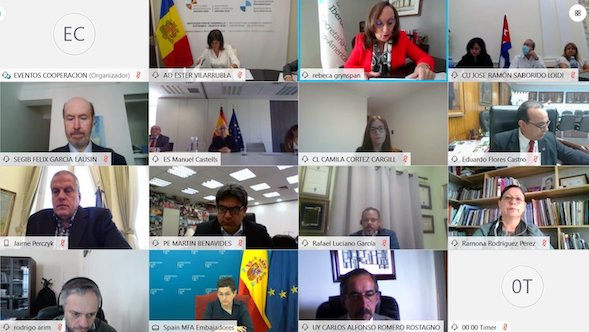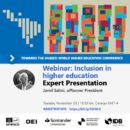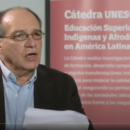Impact of the COVID-19 coronavirus crisis in HEI: responses to the emergency and digital transformation of higher education

By José Antonio Quinteiro Goris | The Ibero-American General Secretariat (SEGIB) and the Ministry of Foreign Affairs of the European Union and Cooperation of the Government of Spain have been organizing different meetings that, in the form of high-level political dialogues, deal with the impact of COVID 19 within the Ibero-American sphere.
Within this framework, the “Diálogo sobre el impacto de la crisis del coronavirus COVID-19 en las Instituciones de Educación Superior: respuestas a la emergencia y transformación digital de la Educación Superior” (“Dialogue on the impact of the COVID-19 coronavirus crisis in Higher Education Institutions: responses to the emergency and digital transformation of Higher Education”) was organized on June 29. This meeting highlighted the importance of reflection and relevance of national initiatives in response to the need to continue university academic activities in a non-presential manner, pointing to the need of outlining an Ibero-American strategy to address digital transformation in a comprehensive way, as a categorical imperative in order to mitigate the effects of the COVID-19 pandemic, as well as to maximize the potential that educational technologies provide.
The opening session of the meeting was led by the Ibero-American Secretary General, Rebeca Grynspan, the Minister of Universities of Spain, Manuel Castells Oliván, and the Minister of Foreign Affairs, European Union and Cooperation of Spain, Arancha González Laya. The event also featured the virtual participation of some of the most important governing authorities of higher education in the Latin American and Caribbean region.
The dialogue was structured around four axles that correspond to the areas that were revealed as strategic in the I meeting of Ministers and Eminent Authorities of Higher Education of Latin America, held in Havana, Cuba, on February 10 and 11:
- Teacher training and access of the university community to resources for teaching and learning;
- Quality assurance of virtual education;
- Equity in the access and continuation of higher studies in the non-presential mode;
- Internationalization of the University in the current situation of restricted international mobility.
Rebeca Grynspan extended a cordial greeting and took advantage of the opportunity to review the impact of the pandemic, noting that “universities generate two-thirds of scientific knowledge in Latin America, and this is the basis for the innovation that we so badly need.” In this regard, she recalled the meridian importance of innovation at the XXIV Ibero-American Summit of Heads of State and Government held in the Mexican city of Veracruz, underlining the importance of not only ensuring the pedagogical continuity of universities, but also of its research agenda, “without which there is no innovation.”
Then the Minister of Universities of the Kingdom of Spain, Manuel Castells, stated that “if there was any doubt about extensive virtual and distance education, this pandemic finished convincing us.” Castells pointed out that the ministry under his charge is advancing an ambitious plan for this summer that will train teachers in virtual education methodologies, understanding that the new reality will be a hybrid model with “an adapted presence”.
For her part, Arantxa González Lama stressed the importance of “marrying” the theme chosen by the 2020 Summit, that is, innovation, with education in the current scenario of the pandemic. In this regard, she pointed out that “we must advance in unveiling the capacities and structures for innovation that exist in our universities”, incorporate innovation as a dimension of the curriculum and, even, incorporate educational innovation as a vehicle to incorporate opportunities for change in the teaching of the faculty.
After this introductory part, and in an effort to highlight the convergences and divergences related to the effects of the pandemic on Ibero-American higher education, the reflections collected from the debate were grouped according to the meeting’s pre-declared axles, concentrating the convergences and divergences of the accounts in each one of them.
- The need to focus Ibero-American cooperation on teacher training in methodologies, pedagogies and the appropriation of technologies that allow transferring what is done in the face-to-face classroom, to the virtual classroom, in the best possible way.
In this sense, special projects are required to strengthen distance education. This ranges from special and massive training plans for teachers, administrative staff and students, to investment in infrastructure and technology.
Concerning this aspect, the Minister of Education of the Republic of Peru, Martín Benavides Abanto, pointed out the need to create an Ibero-American Agenda for Digital Transformation to allow the transition from “emergency remote teaching” to “virtual distance education (DE)”. His counterpart, Francisco Luciano Concheiro, Sub-Secretary of Higher Education of Mexico, suggested the creation of two working groups: one to outline a strategy for the training of teachers and remote educational systems, and the other to favor the working conditions of the DE teaching staff.
In this regard, it seems that there are no divergent voices, although, of course, this urgent need for a drastic change from face-to-face to virtuality has its nuances, according to what was indicated by the representative of the Andorran Government, Ester Vilarrubia, since this Principality has been offering all their academic degrees in an essentially virtual manner for a long time.
Some initiatives already underway are presented by Rafael Luciano, representing the Minister of Higher Education, Science and Technology of the Dominican Republic, by offering diplomas and short courses for the training of teachers throughout the country.
- The synergies that would be produced by sharing the teaching and learning resources that are already in electronic format and that would be easily interchangeable, as well as “good practices” of equity in the access and permanence of students
It is necessary to create spaces and encourage cooperation synergies between Ibero-American countries. In this sense, the Minister of University Education of the Bolivarian Republic of Venezuela, César Trómpiz, announced two of the plans that the ministry under his charge is carrying out, namely, “Cada Familia una Casa” (“Each Family a House”) in support of basic education, and the “Universidad en Casa” (“University at Home”), making the methodologies associated with these programs available to the audience. Minister Trómpiz also announced the availability of 10,000 scholarships for the training of medical doctors under the Programa Nacional de Formación de Medicina Integral Comunitaria (National Training Program for Comprehensive Community Medicine).
In this same vein, Jaime Perzyk, Secretary of University Policies of the Argentine Republic, pointed out that they are working on a large national resource portal for teachers and students, and invited to expand it with contributions of the same genre to broaden its geographical scope. A portal of a similar nature under the name of SABER is being developed in Costa Rica, as stated by the Executive Director of CONESUP, Nuria Méndez Garita.
The Rector of the Autonomous University of Honduras, Francisco José Herrera Alvarado, talked about the production of more than 300 videos and didactic resources produced in an open format that is available to other countries.
Regarding equity of access and permanence, important initiatives such as “connectivity grants” (Argentina), negotiations with mobile phone operators for reduced rates for navigation and downloads from university IPs (Panama), postponement of periods for the consignment of requests for tax subsidies (Chile), permanent psycho-emotional orientation to teachers and students (Dominican Republic), among others, were highlighted.
- The general concern about quality assurance in virtual education, and that recalls the need to promote the agreement sealed in Havana on this issue
Camila Cortéz, head of the Division of University Education in the Under-secretariat of Higher Education of the Ministry of Education of Chile, pointed out the creation of the SINACES Committee for the implementation of clear and defined mechanisms of instruction and communication in order to ensure an adequate response to the pandemic, but also with a view to ensuring the quality of the teachings given within the framework of virtuality.
Mercedes Siles Molina, director of the National Agency for Quality Assessment and Accreditation (Spain) spoke about quality assurance of virtual education. In this sense, this agency has a strategy for quality assurance in virtual teaching that consists of three phases: a) accompaniment in the face of the Covid-19 pandemic during the 2019/2020 academic year, b) implementation of the quality seal of virtual teaching, and c) launch of the seal of excellence for virtual teaching. According to Siles Molina, the key to the success of transferring content to virtuality and quality “lay in the excellent work of the universities, the role of governments and the model itself”. Director Siles Molina added that “they have already recommended Spanish universities to plan the academic year 2020-21 in a hybrid format”, and to implement the quality seal for virtual non-face-to-face teaching as “a way of being able to recognize excellence in work under these modalities”.
This concern about quality assurance in virtual education was shared by the Minister of Higher Education of Cuba, José Ramón Saborido Loid, the Executive Director of CONESUP of Costa Rica, Nuria Méndez Garita, Ramona Rodríguez, rector of the National Autonomous University of Nicaragua, among others.
- The need to start addressing virtual mobility given the impossibility of materializing mobility with physical displacement in the context of the current pandemic.
As reported by Ester Vilarrubia, the University of Andorra suspended all academic mobility since March 2020. Such an assertion allows us to infer that this has been done by most of the higher education institutions located in larger countries. According to the moderator of the session, Félix García Lausín, and given the state of prostration in which academic mobility will remain in the context of the current pandemic, it is necessary to promote academic mobility in virtual mode, although this cannot be considered “as a substitute because it lacks the essential experiential ingredient of students and teachers in a foreign campus”.
RELATED ITEMS








